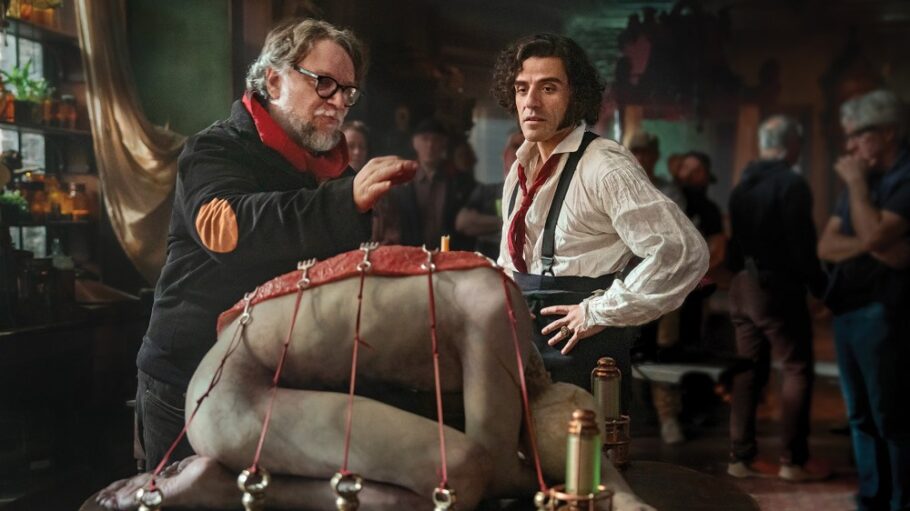Guillermo del Toro doesn’t just direct monsters — he understands them.
The Oscar-winning auteur behind “The Shape of Water” (2017) and “Pan’s Labyrinth” (2006) has built a career elevating genre cinema through stories of misunderstood outsiders. But with his long-awaited adaptation of “Frankenstein,” the Mexican filmmaker has returned to what he calls his creative origin — and maybe his most personal film yet.
“To me, the point of origin was ‘Frankenstein,’” del Toro tells Variety. “This is not a monster movie. This is a story about what it means to be human.”
Del Toro’s take on Mary Shelley’s 1818 novel isn’t horror in the conventional sense — it’s myth, metaphor and opera. After decades in development, “Frankenstein” finally premiered at the Venice Film Festival to rapt curiosity, followed by two sold-out surprise screenings at Telluride. Now it arrives in Toronto, where its sprawling visual language and emotional core will be on full display for North American audiences.
The film stars Oscar Isaac as Dr. Viktor Frankenstein, Jacob Elordi as the Creature, Christoph Waltz in a mysterious supporting role and Mia Goth in a performance shrouded in secrecy. Together, they anchor what del Toro calls a “gothic rock concert about loneliness.”
“It’s intimate and grand at the same time,” he says. “It needed to feel like grief and love and rage could all exist together.”
At the heart of “Frankenstein” is Elordi’s transformative performance as the Creature — almost unrecognizable beneath the film’s elaborate prosthetics.
Love Film & TV?
Get your daily dose of everything happening in music, film and TV in Australia and abroad.
“One thing I love about this creature, especially when he’s first born, is that he’s like a child,” del Toro says. “He’s discovering the world moment to moment.”
Del Toro describes Elordi’s movement as having “balletic grace,” a physicality that echoes the director’s belief in monsters as beings of beauty as much as terror.
But while Elordi’s quiet presence drives the emotional arc, it’s Isaac’s Viktor Frankenstein that adds the film’s volatile pulse.
“In terms of range — what [Isaac] gets to do and play in his career — he gets to go up, down, grand, intimate,” del Toro says. “He brings this fury, this guilt, this madness. It gives the film its heartbeat.”
Del Toro has been trying to make “Frankenstein” for most of his career. Why now?
“I’ve been following the creature since I was a kid,” he says. “I waited for the movie to be done in the right conditions — both creatively, and in terms of achieving the scope to make it different. To make it at a scale where you could reconstruct the whole world.”
That world is unmistakably del Toro’s: richly textured, lovingly detailed and even emotionally devastating. The film’s craft — from production design and makeup to Alexandre Desplat’s elegiac score — is already drawing awards buzz.
“This movie doesn’t pull its punches,” del Toro says. “There’s a brutality to it. But there’s also grace. And maybe that’s the point — that both can exist in the same body.”
Still, reception has been mixed — an 81% score on Rotten Tomatoes and split reactions out of Venice and Telluride mirror what happened with del Toro’s “Nightmare Alley” (2021). That film, while seen as a box office underperformer, still earned four Oscar nominations, including best picture. “Frankenstein” could follow a similar path.
Netflix is already positioning it as one of its major awards contenders this year, alongside Noah Baumbach’s “Jay Kelly” and Kathryn Bigelow’s “A House of Dynamite.” With its rich aesthetic and lived-in performances, “Frankenstein” has the potential to make a strong showing in various artisan races.
He never lets the “divisive” nature of his movies get him down, the same way he doesn’t let it cripple him when one of his many ideas doesn’t get greenlit by a studio.
“I’ve written 30 scripts and made 13 movies,” del Toro says. “When a movie doesn’t move forward, I tell my team, ‘It was good practice.’ And in the end, if all I got to make was 13 movies, that’s 13 more than many others get to make in their lifetime.”
Del Toro’s artistic generosity is matched by his deep loyalty to the filmmaking community.
“If [young filmmakers] need three days from me to watch their movie and give feedback, I’ll give it to them,” he says. “Every Sunday, me and many of my colleagues get together and paint. No industry talk. Just paint. I make quesadillas, and that community is vital to the survival of our business.”
That generosity — along with his cinematic vision — has made him one of the most beloved figures in Hollywood; something a pushy publicist can’t buy you in this town.
“Frankenstein” is the story of a being created, then discarded. Of rage born from abandonment. But it’s also about wonder, about the possibility of love in a world that refuses to give it.
“People think monsters are scary,” del Toro says. “But they’re just trying to survive in a world that doesn’t love them back.”
Like the Amphibian Man in “The Shape of Water” or the ghost children in “The Devil’s Backbone,” the Creature is both terrifying and tender, a figure of tragedy wrapped in spectacle.
And perhaps, like its maker, this monster might finally find the love it deserves.
“Frankenstein” premieres at the Toronto Film Festival on Monday, Sept. 8.
From Variety US































